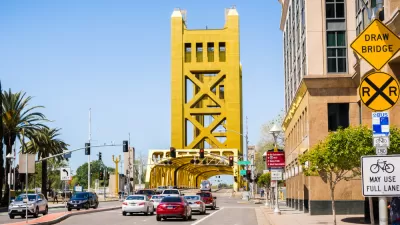An argument for the value of including planners in industries far beyond city planning.

In a piece in The Handbuilt City, Nat M. Zorach argues that companies of all kinds could benefit from hiring urban planners. “More companies, especially public utilities and any firm dealing with infrastructure of any kind, should hire city planners on their staff. It’s a huge value-add,” Zorach writes.
“The core of my pitch is that city planners understand interrelated, complex technical and non-technical systems, in a way that the average professional does not.” As Zorach explains, “Cities, like corporations, are not islands, nor are they oases. They operate in a complex regulatory environment, much like a corporation does, dealing with municipal regulations as well as state and federal law. Similar to how corporations can raise funding through everything ranging from IPOs to crowdfunding to promotion sales, cities also source capital from different places– like use fees, taxation districts, federal grants, state grants.” Planners can bring together diverse skills and help devise solutions that more siloed professionals may not think of.
Lastly, “Planners might not always be the best communicators, but even the worst communicators in planning generally understand how to connect with the general public better than the average corporate sector player. This is valuable in building consensus, obtaining buy-in, or facilitating broad collaboration.” Experience with community outreach and public meetings can go a long way in the corporate world, which is largely disconnected from the average consumer and citizen.
FULL STORY: Blueprint for Value: Why Companies Need City Planners on Their Payroll

Study: Maui’s Plan to Convert Vacation Rentals to Long-Term Housing Could Cause Nearly $1 Billion Economic Loss
The plan would reduce visitor accommodation by 25,% resulting in 1,900 jobs lost.

North Texas Transit Leaders Tout Benefits of TOD for Growing Region
At a summit focused on transit-oriented development, policymakers discussed how North Texas’ expanded light rail system can serve as a tool for economic growth.

Using Old Oil and Gas Wells for Green Energy Storage
Penn State researchers have found that repurposing abandoned oil and gas wells for geothermal-assisted compressed-air energy storage can boost efficiency, reduce environmental risks, and support clean energy and job transitions.

Private Donations Propel Early Restoration of Palisades Playground
Los Angeles has secured over $1.3 million in private funding to restore the Pacific Palisades playground months ahead of schedule, creating a modern, accessible space that supports community healing after recent wildfires.

From Blight to Benefit: Early Results From California’s Equitable Cleanup Program
The Equitable Community Revitalization Grant (ECRG) program is reshaping brownfield redevelopment by prioritizing projects in low-income and environmental justice communities, emphasizing equity, transparency, and community benefits.

Planting Relief: Tackling Las Vegas Heat One Tree at a Time
Nevada Plants, a Las Vegas-based nonprofit, is combating the city’s extreme urban heat by giving away trees to residents in underserved neighborhoods, promoting shade, sustainability, and community health.
Urban Design for Planners 1: Software Tools
This six-course series explores essential urban design concepts using open source software and equips planners with the tools they need to participate fully in the urban design process.
Planning for Universal Design
Learn the tools for implementing Universal Design in planning regulations.
Ascent Environmental
Borough of Carlisle
Institute for Housing and Urban Development Studies (IHS)
City of Grandview
Harvard GSD Executive Education
Toledo-Lucas County Plan Commissions
Salt Lake City
NYU Wagner Graduate School of Public Service





























